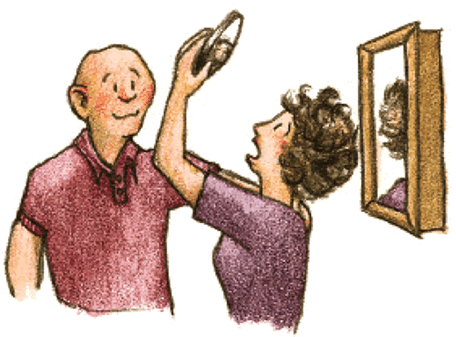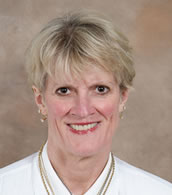Hair Loss Distress for men and women
Caryn Schulz, MD
Dermatology
Caryn Schulz, M.D.
Eau Claire
Both men and women find hair loss distressing, women generally more so. There are several different kinds of hair loss. I will discuss the aspects which are different in men and women and those which are common to both.
“The most common reason for a male to lose his hair is what is know as androgenetic alopecia, a response to the combination of male sex hormones and genes.”
This occurs in more than 75% of men. It typically begins in people in their mid 20’s, not uncommonly later or earlier. The first sign of hair loss is a recession of the hairline above the temples. Following the temples, the crown is next. Commonly, men have hair loss on both temples and a bald spot on top.
 Treating androgenetic alopecia is very difficult. The most successful drug used for men is Propecia. It suppresses testosterone’s promotion of hair loss. For it to be successful, it must be started very early, preferably as soon as any thinning of the hair is noticed. This drug must be taken regularly. It usually stops hair loss and there is often re-growth with a noticeable improvement and a retardation of progress to baldness.
Treating androgenetic alopecia is very difficult. The most successful drug used for men is Propecia. It suppresses testosterone’s promotion of hair loss. For it to be successful, it must be started very early, preferably as soon as any thinning of the hair is noticed. This drug must be taken regularly. It usually stops hair loss and there is often re-growth with a noticeable improvement and a retardation of progress to baldness.
There are other ways that men can lose hair, but they are not common. An auto-immune condition called alopecia areata affects both sexes and is a disorder in which the body’s immune system attacks the hair follicles.
There are three types of alopecia areata: circumscribed, diffuse and telogen effluvium. Circumscribed means the hair falls out in coin shaped places leaving small bald spots without thinning the hair on the rest of the head. This type of hair loss, in both sexes, is very capricious and unpredictable. There is no way to predict its extent or duration. There is no particularly good treatment for alopecia areata whether it be circumscribed or diffuse in which all of the head hair thins. Diagnosing alopecia areata is relatively simple. Treatment possibilities are very limited and include tiny cortisone injections in affected spots, a sulfide drug called Dapsone, short term systemic corticosteroid pills or injections.
There is one other form of alopecia and that is telogen effluvium. Telogen effluvium is best explained as a loss of hair that would otherwise not be growing and not be shedding, but resting on the scalp at any given time. The common time to have telogen effluvium is after giving birth to a child. Post partum women often have telogen effluvium. This form of alopecia fortunately is self-limited and usually lasts 6 to 12 months, although it is rare for the hair to grow back completely. Men rarely get telogen effluvium. It can follow severe physical trauma, severe emotional trauma and surgical procedures that are as a result of severe physical or emotional trauma. A few other diseases, most of which can be easily ruled out, can occasionally cause hair loss.
The androgenetic alopecia that we mentioned in men also does occur in women. It usually begins later in life in women and is expressed as thinning of the hair on the frontal portion of the scalp. Almost all women in later life will experience some androgenetic alopecia. In some women it is very extreme and their hair becomes quite thin. There is treatment for this condition. Women cannot take Propecia, but they can take a drug known as Spironolactone, an old drug used as a diuretic. It blocks the effect of testosterone on the hair follicle, inhibits hair loss and when used long term can even result in some hair regrowth. Spironolactone is a good choice for women with androgenetic alopecia.
Finally, a topical drug called Minoxidil, once used intravenously for people with extreme hypertension, was discovered to grow hair. It was put in a liquid that is applied to the scalp. About a third of the people who use Minoxidil twice daily for a long period of time do grow some hair back.
Dermatologists are well trained to treat hair loss and sympathetic with their patients’ understandable concerns.
Dr. Caryn Schulz – Caryn Schulz, M.D.
For information or to schedule an appointment:
715-839-9400 | www.oakleafmedical.com
Dr. Schulz sees patients in Eau Claire.





 © 2009 OakLeaf Medical Network and OakLeaf Surgical Hospital. All rights reserved.
© 2009 OakLeaf Medical Network and OakLeaf Surgical Hospital. All rights reserved.